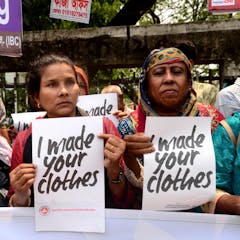
Articles on Rana Plaza Factory
Displaying all articles

A new study suggests disclosure laws to prevent forced labour in the clothing industry are a form of window dressing designed to ease the conscience of consumers rather than protecting workers.

The collapse of Rana Plaza on March 24, 2013, put the focus on fast fashion. But research shows that stressed and struggling consumers don’t have the luxury of making ethical choices.

Ten years after the collapse at Rana Plaza in Bangladesh, the garment industry’s deadliest disaster, reforms are incomplete. The opaqueness of today’s complex supply chain is part of the problem.

Until there are global standards for authentic corporate social responsibility efforts, we will continue to see local impoverishment, hazardous waste and tragic labour accidents in the Global South.

Despite a recent Tahoe Resources settlement and apology to Guatemalan protesters, Canadian companies can still get away with crimes committed abroad — even in the face of insurmountable evidence.

Fashion Revolution week puts a spotlight on the modern slavery conditions of the fashion industry and encourages fashion consumers to ask, “who made my clothes.”
